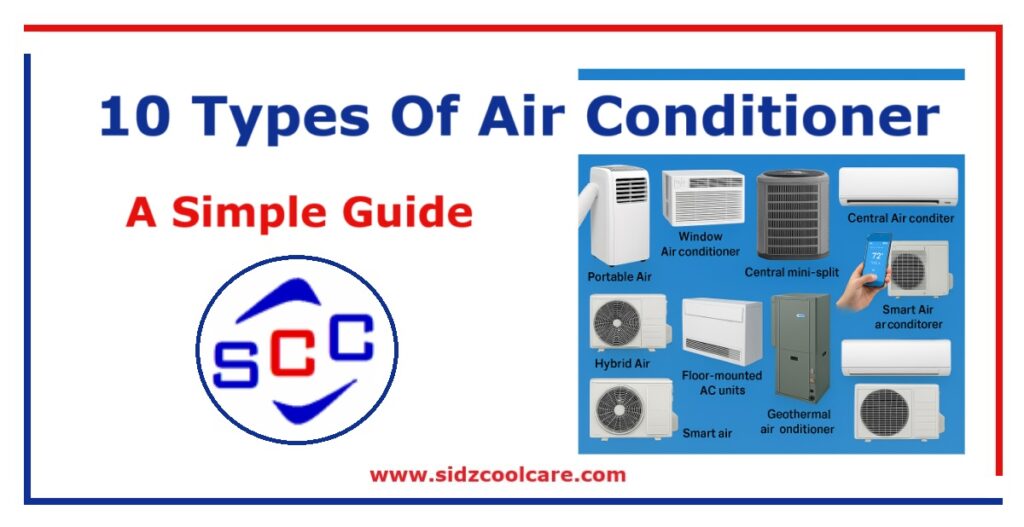When summer gets too hot, an air conditioner becomes your best friend. But with so many types available, choosing the right one can be confusing. Some are small and simple, while others cool an entire house. In this easy guide, we’ll explore 10 types of air conditioners, their pros and cons, and how to pick the best one for your home.
10 Types of Air Conditioners: A Simple Guide
Your air conditioner shapes your comfort, budget, and home vibe. Whether you’re cooling a cozy nook or a sprawling estate, knowing your options ensures you nail efficiency and style. Here’s our fresh take on ten air conditioner types to suit every need.
1. Ductless Mini-Split Air Conditioners
Ductless mini-split air conditioners are wall-mounted units connected to an outdoor compressor. They are great for small homes, add-ons, or rooms without ducts. These ACs are quiet, energy-efficient, and allow separate temperature control for each room. However, they can be expensive upfront and may not blend well with your home decor.
2. Central Air Conditioners
Central air conditioners cool an entire home using a duct system. They are ideal for large homes needing even cooling. These systems work quietly indoors, are energy-efficient, and blend seamlessly into your home. However, they require a high installation cost and need an existing duct system.
3. Window Air Conditioners
Window AC units are compact and fit into a window or wall opening. They work well for small apartments or single rooms. They are affordable, easy to install, and widely available. However, they can be noisy, block window views, and only cool one area at a time.
4. Portable Air Conditioners
Portable air conditioners are small units with a hose that vents out through a window. They are great for renters or rooms without built-in AC. These units don’t require permanent installation, are easy to move, and are budget-friendly. However, they are not as powerful, take up floor space, and need a window for ventilation.
5. Cassette Air Conditioners
Cassette air conditioners are installed in the ceiling and distribute cool air evenly throughout a room. They are perfect for offices, apartments, and rooms with high ceilings. These ACs save space, cool evenly, and operate quietly. However, they are expensive to install and require ceiling space.
6. Geothermal Air Conditioners
Geothermal air conditioning systems use the earth’s natural temperature for cooling and heating. They are ideal for eco-friendly homeowners and new constructions. These systems are highly efficient, reduce energy costs over time, and may qualify for tax benefits. However, they are expensive to install and require digging in your yard.
7. Hybrid/Dual-Fuel Air Conditioners
Hybrid or dual-fuel air conditioners combine a heat pump with a gas furnace to provide year-round temperature control. They are best suited for homes in areas with hot summers and cold winters. These systems save energy and offer efficient cooling and heating. However, they require higher maintenance, and the heat pump may not be effective in extremely cold weather.
8. Smart Air Conditioners
Smart air conditioners come with Wi-Fi and smart features, allowing remote control via an app or voice commands. They are great for tech-savvy homeowners looking for convenience and energy savings. These ACs are efficient and easy to control, but they are more expensive and may take time to set up and learn.
9. Floor-Mounted Air Conditioners
Floor-mounted air conditioners are installed near the floor and are commonly found in hotels or small rooms. They are ideal for homes with limited wall space or unique layouts. These ACs are compact, easy to install, and don’t require ductwork. However, they can be noisy and are designed for cooling a single room at a time.
10. Evaporative Coolers (Swamp Coolers)
Evaporative coolers, or swamp coolers, use water evaporation to cool the air. They are best suited for dry, hot climates. These systems are eco-friendly, cost-effective to run, and add moisture to dry air. However, they are ineffective in humid climates and do not provide strong cooling power.
How to Choose the Right AC
Picking the right air conditioner depends on several factors: Room Size: Small rooms work best with window or portable units, while larger homes need central or ductless systems. Energy Efficiency: Mini-split and geothermal systems save money long-term. Budget: Window ACs are affordable, while geothermal and hybrid systems require a higher investment. Installation Needs: Renters should choose portable or window ACs, while homeowners can opt for built-in systems like central or cassette units.
Frequently Asked Questions
Which air conditioner lasts the longest? Central ACs from top brands, when installed professionally, have the longest lifespan. What’s the best AC for bedrooms? Ductless mini-splits are quiet, efficient, and perfect for bedrooms. How big of an AC do I need for a 2,000 sq. ft. home? Typically, a 3 to 4-ton unit, but an HVAC expert can help based on insulation and windows.
Conclusion
Air conditioners come in many types, from simple window units to whole-home cooling systems. Choosing the right one depends on your space, budget, and cooling needs. With the right AC, you can enjoy a cool, comfortable home all summer long!
Read More-



I loved your description of the central air conditioner and how it can cool multiple rooms at once. Since we need some cooling for all of our rooms including the home office and the living room, we’re going to need a powerful system that makes sure everyone gets to feel relaxed. I’ll take your word for it and have an HVAC contractor in the area install a central unit for us.
My brother is looking for a cooling unit for his new home theater setup around his basement. I like your idea of getting a mini-split air conditioner because of its energy efficiency. I’ll be sure to discuss this idea with him so that he could have one installed by a professional.